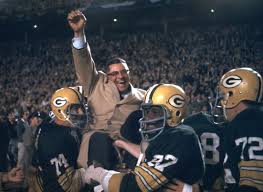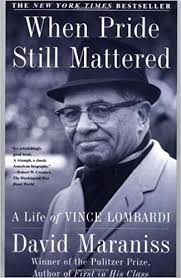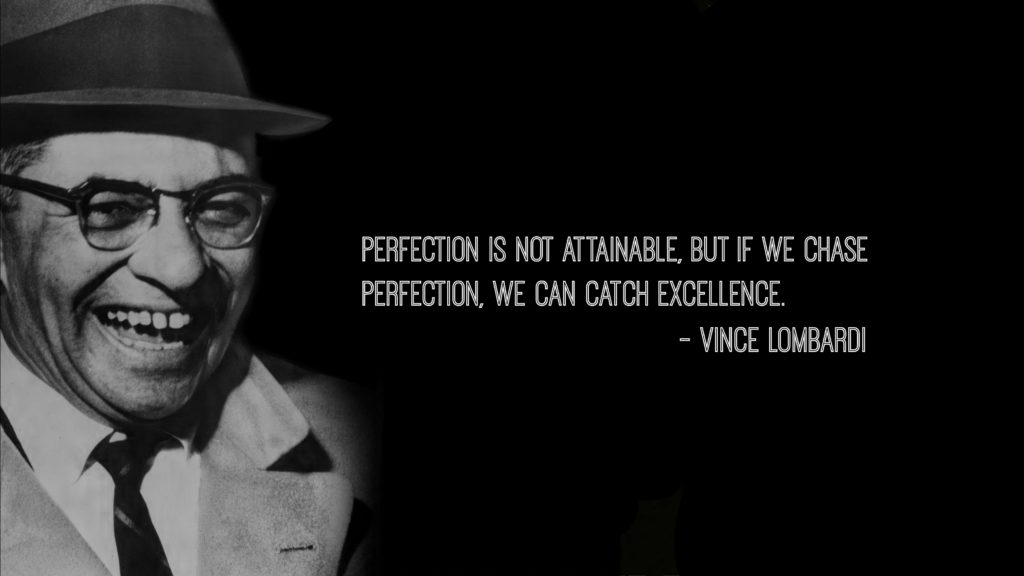Ladies and Gentlemen the Savior Had Come Again

By the Rev. Dr. Bronwyn Yocum*
A Sermon Preached at Thorndale UMC, September 8, 2019
(Showtime preached at Grove UMC, September 7, 2014)
An platonic message for the start of a new NFL pro football flavour
Sermon scripture text: Psalm 78:one-eight
Today is one of my nigh favorite days of the year. Today is the opening weekend of the National Football game League season. Since I was a little kid, I have watched and loved football. Nosotros can all accept loftier hopes for the Philadelphia Eagles since they haven't played any games all the same with the starting players on the field. I volition root for the Eagles, but for some reason, in my early years, I took a liking to the Green Bay Packers, and they were my favorite team. Bart Starr, Paul Hornung, Jim Taylor, they were the men I dreamed of on Dominicus night afterward the game. Simply the all-time guy of all was Vince Lombardi, coach of the Packers.

Lombardi had arrived equally the Packers' autobus in early 1959. The squad hadn't had a winning flavour since 1947, and the year before Lombardi's arrival their record was 1 win, ten losses and 1 tie. Lombardi clearly had his work cut out for him. In his very outset team meeting after his rent, Lombardi told his players, "I have never been on a losing team, gentlemen, and I practise not intend to first now." True to his word, Lombardi never knew a losing season equally a caput coach.
That summer of 1959, when the Packers reported for training camp, Lombardi challenged his players in every style possible. He was charged with the seemingly impossible task of turning the franchise effectually, and he was pumped upwards virtually information technology. He led practices – inspiring, training, motivating the players. Merely one day, in the heart of a do, Lombardi got so frustrated with what was going on with the players that he blew his whistle. "Everybody stop and gather effectually," he said. Then he knelt down, picked upward the pigskin, and said, "Let's first at the beginning. Gentlemen, this is a football. These are the one thousand markers. I'm the coach. You are the players." He went on, in the near elementary way, to explain the basics of football.

After, Hall of Fame players like Starr and Hornung would talk about how much they had learned from Lombardi. After that year, he began every subsequent flavor with the aforementioned speech, "Gentlemen, this is a football." He never took for granted that his players knew the basics. In fact, many of them said that the genius of his coaching was his ability to interruption down the game into its simplest elements and teach them over again and over again. In the introduction to his volume about Lombardi, When Pride Still Mattered, David Maraniss wrote: "Lombardi was a Jesuit in his football game instruction, equally in most other things… He fabricated things elementary for his players by taking nada for granted, repeating the aforementioned lessons to them over and over, every 24-hour interval, every twelvemonth. He would spend hours diagramming 1 play, the Packer sweep, and so that his players knew how to adjust to whatever defense the opposition might employ. The point of his repetition," Maraniss concludes, "was a timeless idea that is as applicable in jazz and trip the light fantastic toe and writing and other art forms, and peradventure in faith, every bit in football—freedom through discipline."
Past focusing on the basics, past repeating them over and over once more, Lombardi instilled them into his players so that doing the basics became second nature. He believed they were never too experienced to go back to the nuts and review them once again, and they came to empathize the value of that return to basics.
Too often, we in the church think we've passed the basics. Nosotros "did" Sunday Schoolhouse, we say. We "graduated" from Christian Education when nosotros were confirmed and at present we merely get to live our lives and come to church in one case a week for worship. But God is a lot more like Vince Lombardi – peradventure its the other way effectually. In the kingdom of God, nosotros are all learners and God is our lifelong teacher; or to put it in the language of the season, God is the coach and we are the players on the field. Like Lombardi's Light-green Bay Packers, nosotros may have years of experience behind us, years of Christian living under our chugalug and bible studies completed, only nosotros will never graduate from this school in our lifetime.

The very proper name we utilize to describe ourselves equally followers of Jesus says it all. We are disciples. The word literally means student or learner. Great teachers in the ancient world would get together around themselves students who wanted to learn. These students wouldn't simply attend lectures, have notes and so go home. They would acquire past observing and listening to everything the instructor did and said. They lived with the teacher, ate with the teacher, spent every possible minute with the instructor, simply every bit Jesus' 12 disciples lived with him. 24-hour interval and dark the disciples watched how the teacher interacted with the world around them. Oh, there were formal lessons at times – "Listen, a sower went out to sow." But most of the learning came from simply taking annotation of how the teacher lived their daily life, so that they, also, could live equally their teacher lived.
When I was in high school, my church youth group leader was a volunteer. Mr. St. Clair had started out to become a Jesuit priest, but somewhere along the way he left that path and the Roman Catholic Church to become a Protestant and a loftier school Latin instructor. Every weekend he had students over to his house for a weeks long-running game of Monopoly. Two days a week before school he voluntarily taught Greek classes for anyone who was interested in learning. His Latin classes were ever fascinating – memorizing the opera Dido and Aeneas as we read the Aenead, making a Trojan Horse out of the boxes our desks had come in and then reenacting scenes from the story of Aeneas. He taught united states Latin, but more than that, he taught u.s. that learning could be fun and interesting and collaborative. And at church, he taught usa to remember critically near our faith, bringing both our heed and our eye to our commitment to Jesus Christ. My life was shaped past years of interacting with him – non just past daily 45 minutes Latin classes, but by observing how he lived, listening to how he talked about his faith, affectionate how he cared for his students and imitating how he worshipped the God he served.
Today, we see Christian Education classes shrinking, bible studies being cancelled and Sunday Schools disappearing. We see churches preaching prosperity gospel to make people feel good without having to think. Don't fall for that; don't make the mistake of saying, "I did that stuff as every bit kid." No matter how onetime you are, no thing how long you've studied the bible, there is always more than to acquire, ever some new appreciation of God's saving activity in the globe, some way of using our critical thinking skills to improve understand Scripture. And truth exist told, every one of united states can, like Lombardi'south Packers, do good by going back to the nuts. We need to remind ourselves of what we believe and why we believe it, not just assume that because we said aye to Jesus twenty years ago, everything is withal the aforementioned.

Wayne Cordiero, the pastor of New Hope Church, a mega church in Hawaii, tells story of a Russian Orthodox priest who was discouraged and downcast after decades in ministry. One evening he wandered in the woods and came out near a military base.
A young armed guard at the perimeter stepped forward and shouted, "Halt! Who are y'all and why are you here?"
Roused from his melancholy, the priest looked up and asked, "What did you say?"
The soldier became even more stern and said, "Who are you and why are y'all hither?"
The priest and so said the strangest thing. He asked the young soldier, "How much do you get paid?"
The beau was caught off guard by the question, and answered, "Why does it matter to you?"
"Considering," the priest replied, "I'll pay you that much to ask me those same ii questions every day."
Each i of the states needs to revisit the basic questions of our faith periodically. Who am I? Why am I here? What does Jesus Christ hateful in my life today? How practise I live out my commitment to God in my daily life now? Why practise I bother to go upwards every Sunday forenoon to get to church? What divergence does God brand in my life? What difference does church make in my life? The answers you gave twenty years ago or ten years ago or even last year may no longer accurately reflect your religion understanding. The earth around us changes; our life changes; we change. And equally we change, our relationship to God changes and adapts to the electric current circumstances in our life. And so we must regularly reexamine ourselves, our relationship with God and how nosotros are living out our faith.

Information technology'due south all also easy to start taking our faith for granted, to turn on the motorcar pilot switch and merely coast through our spiritual life. Nosotros think we're heading in the correct direction, and and so we turn off our passion, we wait at the basics and say, yeah, yep, yeah. Nosotros assume that deep within our eye nosotros still believe what we said we believed when we first joined the church, without examining our belief system. Our mouths may say i thing, only do our lives and actions say the same affair? Have we become lukewarm? Practise nosotros still orient our life around God'due south will and God's way? A aeroplane on auto pilot tin can keep flying quite a ways even without a pilot in the cockpit. If we're lucky, we take an experience like that priest'south, something that brings us up short and invites u.s.a. to a fourth dimension of cocky exam of our faith, something that sends united states of america dorsum to the basics.

Permit me share i final story about Karl Barth, one of the greatest theologians of the 20th century. His theological treatise, Church Dogmatics, presents his view of Christian theology in five volumes and is regarded by many equally the finest theological achievement of modernistic theology. Many years agone, when he visited the United States for a lecture tour, an enterprising announcer asked him, "Dr. Barth, can y'all give us the essentials of your theology in a few sentences?" Barth looked at the young journalist for a moment, and so he answered, "Jesus loves me, this I know, for the Bible tells me and so."
What we began as young children in a Lord's day School classroom may expand and grow and develop, but the basics never change. We come up here to church remembering the ane who taught usa through all of his life – through his words, yes, merely too through every action, every relationship, every style in which he connected with the world effectually him. And every mean solar day nosotros take an opportunity to check in with the basics of our faith once more. Oh, choirs and classes, mission projects and fellowship events are all wonderful, only we need regularly to render to those basics like Lombardi'south players, to inquire the essential questions of our faith. If nosotros revisit those basics and allow them to renew and replenish our religion, and then there is nothing we cannot accomplish for the kingdom of God. Like Lombardi talking to his Packers, we need to be reminded, This is the bible, this is the cantankerous on which Jesus died for our sin, and we are the Trunk of Christ – God'southward manner of incarnating love in the world today. Amen.
*Rev. Dr. Bronwyn Yocum, a retired pastor, is Manager of Methodist Student Advising and Ethos at Palmer Theological Seminary, Eastern University, St. Davids, PA
Source: https://www.epaumc.org/blogs/ladies-and-gentlemen-this-is-a-bible/
0 Response to "Ladies and Gentlemen the Savior Had Come Again"
Post a Comment